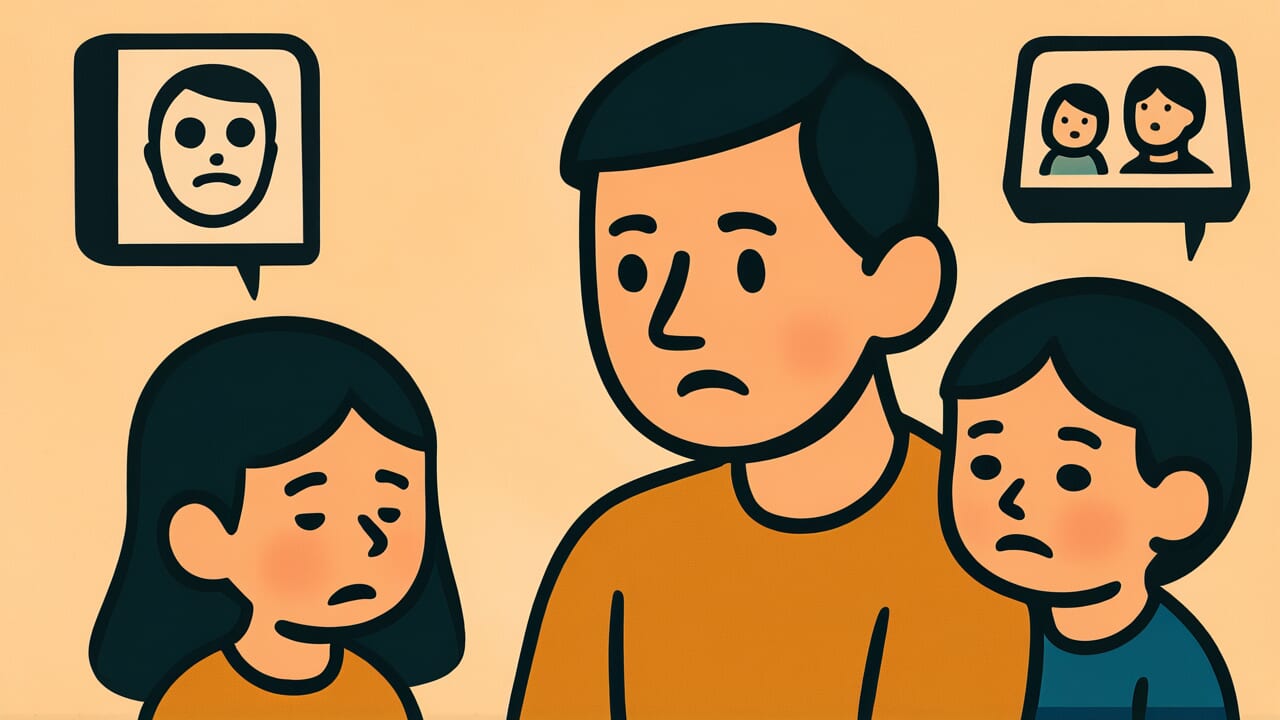How to Read “Having children brings sorrow, not having them brings sorrow too”
Ko wa aru mo nageki, naki mo nageki
Meaning of “Having children brings sorrow, not having them brings sorrow too”
This proverb expresses a truth about life. Whether you have children or not, each situation brings its own worries and struggles.
People with children face endless concerns as parents. They worry about education costs, career paths, health issues, and their children’s futures.
People without children face different kinds of worries. They may stress about having no heir, feel anxious about growing old alone, or sense silent pressure from those around them.
This proverb is used when recognizing that no life situation is perfect. Every circumstance has its own difficulties. It’s a reminder that the grass always looks greener on the other side.
People with children sometimes complain about their struggles. People without children sometimes envy those who have them. This saying warns against such comparisons.
Even today, this proverb offers important perspective. We see others’ happy-looking lives on social media and feel bad about our own situations.
The key is not to compare yourself with others. What matters is doing your best within your own circumstances.
Origin and Etymology
The exact source of this proverb is unclear. However, it was likely already common among ordinary people during the Edo period.
It has been passed down for generations. The saying expresses traditional Japanese views on family and the struggles of raising children.
The structure of the phrase is striking. It uses contrasting expressions: “having” versus “not having.” This parallel construction is common in Japanese proverbs that show life’s dual nature.
Many Japanese proverbs deal with children. Examples include “A child is a clamp” and “Only by having children do you understand your parents’ love.” Among these, this proverb particularly captures human nature.
The gap between expectations and reality about having children has always troubled people. For common folk in the Edo period, children were both heirs and labor force.
At the same time, children brought responsibilities and worries. Couples who couldn’t have children also suffered deeply.
This proverb was born as wisdom that understands both positions. It shows compassion for either circumstance.
It reflects our ancestors’ deep observation of human nature. There is no perfect state in life. Every situation has its own unique troubles.
Usage Examples
- My friend was complaining about how hard raising kids is, but having children brings sorrow, not having them brings sorrow too—I have my own worries
- I was troubled about not being able to have children, but hearing that having children brings sorrow, not having them brings sorrow too helped me see value in my current life
Universal Wisdom
This proverb reveals the essence of human satisfaction. We constantly search for happiness in “what if” scenarios.
When we don’t have children, we think “if only I had children.” When we have children, new worries emerge. This cycle may be fundamental to human nature.
Why can’t people escape this thought pattern? Because humans are creatures who always place hope in the future and try to improve their current situation.
This quality has driven human progress. But it also has a side effect. It blinds us to “the happiness that exists right here, right now.”
Our ancestors passed down this proverb for a reason. They wanted to convey the importance of understanding and accepting this human tendency.
No perfect state exists. Every circumstance has both light and shadow. Knowing this truth frees us from envying others.
It gives us courage to face our own lives. This isn’t resignation. Rather, it’s the strength to see reality clearly.
Life’s worries never disappear—they just change form. That’s precisely why living fully within your current circumstances has value. This is what the proverb teaches us.
When AI Hears This
The human brain cannot measure happiness in absolute terms. It always judges by comparing “the current state” with “something else.”
People without children compare their lives to “a life with children” as the ideal. People with children compare to “the easier past” or “an ideal family without troubles.”
In other words, the brain is wired to always find “what’s missing” in either state.
What makes this worse is hedonic adaptation. Research tracking lottery winners found their happiness returned to baseline levels one year after winning.
The same happens with parenting. The brain quickly adapts to the joy of a long-awaited child. That becomes “normal.” Then the brain starts searching for new dissatisfactions.
Worries about education costs, teenage rebellion, and future anxieties emerge one after another.
Psychologist Daniel Kahneman’s research shows something important. People feel the pain of “what they lost” twice as strongly as the joy of “what they gained.”
With children, the “lost” free time stands out. Without children, the “missing” family bonds stand out.
The essence of this proverb is an inconvenient truth that cognitive science has proven. Human happiness is controlled not by circumstances themselves, but by the brain’s comparison system and adaptation mechanisms.
Lessons for Today
This proverb teaches modern people “the courage to accept your current circumstances.” Remember it when you feel down seeing others’ happy posts on social media.
Remember it when you regret not choosing a different life path.
What matters is understanding that other people’s lives have invisible struggles too. Behind your friend’s fun-looking parenting photos may be sleepless nights and education cost worries.
The person enjoying single life may have anxieties about the future. Everyone lives while carrying some kind of worry.
This understanding leads you in two directions. First, compassion for others. You won’t easily envy or criticize people in different circumstances.
You’ll be able to imagine their struggles. Second, gratitude for your own life. Instead of chasing hypothetical happiness in “what if” scenarios, you’ll notice the small joys that exist right now.
No life is perfect. So live your current life with care. That resolve is the first step toward true happiness.



Comments